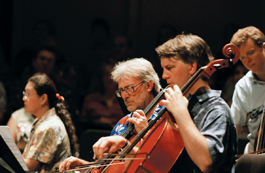home | metro santa cruz index | columns | the rock show

Photograph by Jim Kasson
The Practice: The Carmel Bach Festival Orchestra takes on Bach's Mass in B Minor on opening night.
Going for Baroque
The Carmel Bach Festival explores the work of Heinrich Schütz and other Bach predecessors.
By Scott MacClelland
For the last few seasons, the Carmel Bach Festival has billed itself as the "Bach and Beyond" festival. This reflects music director Bruno Weil's eclectic taste, which, if anything, favors the classical masters Haydn, Mozart and Beethoven. Yet it also offers Bach Festival patrons a vastly rich palette from which to choose.
In his first season last summer, Weil's associate conductor, Andrew Megill--who works with the Festival Chorale--used his Carmel Mission concert to explore the transition from the late Renaissance to the early Baroque through the darkly expressive and strangely pictorial tenebrae (shadows) responses for Holy Week by Carlo Gesualdo, prince of Venosa. This summer, Megill returns his gaze to the early Baroque and works by the greatest German master of that time, Heinrich Schütz. Born exactly 100 years before Bach, Schütz early on discovered the avant-garde innovations going on in northern Italy and traveled to Venice to study with the aging Giovanni Gabrieli. He later returned to absorb the further inventions and techniques of Claudio Monteverdi. Schütz went on to lay the foundation for Bach and Handel, and subsequent generations of European composers, on which to build their own musical edifices.
For his Mission program, Megill puts two of Bach's well-known motets next to Schütz, making the congenital relationship plain. Megill also chose the Schütz work he finds most personally moving, the Musicalische Exequien (musical exequies), subtitled "Concerto in the form of a German Funeral Mass." This first "German Requiem" will be echoed by Johannes Brahms' famous Ein Deutsches Requiem, itself a latter-day homage to the example of Schütz, featured on the Sunday Main matinee program at Sunset Center with an early Bach sacred cantata that includes a love duet between "Jesus" and "the Soul" that is unmistakably erotic in tone.
The festival begins its three-week run this Saturday with Bach's Mass in B Minor, that most monumental of the Leipzig master's works. Ironically, Bach had no reason to believe it would ever be performed during his lifetime--which it wasn't--but instead regarded it as a way to gain royal favor from the Saxon court at Dresden that could give him leverage in dealing with his parsimonious, provincial employers at home. Bach's most colorful chamber music, the Brandenburg concertos, make up the Thursday Main program, under the direction of keyboardist Andrew Arthur. In addition to the Saturday and Sunday programs, Bruno Weil will conduct Friday's "Symphonic Bridges," including a symphony by Johann Christian Bach, Haydn's Symphony no. 95, Beethoven's Egmont Overture and Mozart's Piano Concerto no. 14, featuring David Breitman.
Weil will also lead his musicians in the Tuesday Main program, "Aha! Concerto," which will parade selected concerto movements from three centuries in a show-and-tell performance with festival education director David Gordon and others. (The concerto itself descended from the work of Gabrieli, Monteverdi and Schütz as specifically alluded to by the Musicalische Exequien.) Concertmaster Elizabeth Wallfisch is in charge of the Monday Main program of chamber works by Bach and Brahms.
Returning for multiple seasons, many of the instrumental and vocal soloists have become well known to festival-goers, not least bass-baritone Sanford Sylvan, who is likewise a favorite of Cabrillo Festival audiences.
The Bach Festival occupies three full weeks, with an always-sold-out "Best of the Fest" concert voted on by ticket-buyers as its final punctuation. While the Main concerts are performed three times in as many weeks, one-off solo and chamber recitals enhance the experience, from the Sunset Center lobby to All Saints Church in Carmel, Carmel Mission and Pebble Beach's Church in the Forest. Run-out concerts are performed in Salinas, Monterey, Seaside and Stanford. For the first time in more than a decade the piano makes its return to the festival with fortepiano on the Tuesday Main program and concert grand on the Friday Main. David Gordon conducts the Adams Master Class, sponsored by the Virginia Best Adams Trust, that selects and develops four Chorale singers in free, public sessions with festival solo singers. Miscellaneous lectures and other events are likewise offered to the musically ravenous.
THE CARMEL BACH FESTIVAL opens with the Mass in B Minor on Saturday, July 19, at 8pm at the Sunset Center Theatre, Ninth Avenue and San Carlos Street, Carmel. Tickets are $80/$65. The festival continues through Aug. 9; www.bachfestival.org or 831.624.2046.
Send a letter to the editor about this story.
|
|
|
|
|
|